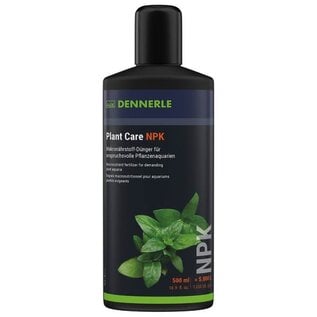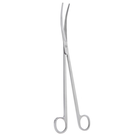Dennerle Plant Care NPK
Dennerle Plant Care NPK is a macronutrient fertilizer for heavily planted aquaria with low fish stocking with (NO3), phosphate (PO4) and potassium (K) plus magnesium (Mg). For splendid plants and intensely bright colors. Content: 250 or 500 ml.
Read more...| Article number: | 38.5.6 |
| Quantity: | 6 |
Dennerle Plant Care NPK
Macronutrient fertilizer for demanding plant aquaria
- Macronutrient fertilizer for heavily planted aquaria with low fish stocking
- With nitrate (NO3), phosphate (PO4) and potassium (K) plus magnesium (Mg)
- For splendid plants and intensely bright colors
- Immediate and long-term effect
- Scientifically tested and optimized according to nature‘s example
Macro-nutrient fertilizers for aquaria without or with low fish stocking
The three macro-nutrients N = nitrogen (nitrate), P = phosphorus (phosphate) and K = potassium are of particular importance. The addition of N and P is usually not necessary in normal, planted community aquaria, as these substances enter the aquarium in sufficient or sometimes even too large quantities via food and fish excretions. In demanding planted aquaria or aquascaping aquaria, on the other hand, the situation is different. They have above-average nutrient requirements, especially for macro-nutrients. These types of aquariums can quickly become N or P deficient, especially with no or low fish stocking. A K deficiency is also possible, but less common, as potassium is always present in some quantity in tap water and is regularly introduced via complete iron fertilizers such as Plant Care Pro. For demanding plant aquariums, it is therefore very useful to keep an eye on the macro-nutrients and supplement them if necessary. Especially important with an NPK fertilizer is the biological balance of the nutrients. The nutrient ratios in Plant Care NPK have been chosen so that all three macro-nutrients are taken up by the plants in equal proportions. This means that even with long-term, regular use, there can be no deficiencies or detrimental accumulation of individual nutrients. This is because nutrient imbalances must always be avoided, as they usually lead to algae problems.
When do I use Plant Care NPK?
Each aquarium has a specific nutrient consumption depending on plant quantity, plant species, animal stocking, feeding, water changes and growth conditions (light quantity/illumination time, CO2 addition, filter technology, etc.). The required NPK addition should therefore be determined individually for each aquarium. Plant Care NPK is only used when necessary, i.e. when there is a real deficiency of macronutrients. We recommend measuring the nitrate and/or phosphate content weekly and dosing Plant Care NPK accordingly. You can also measure the potassium content of the aquarium water (tests in specialized shops). However, this measurement is usually not necessary, as sufficient potassium is supplied by the tap water plus Plant Care Pro and Plant Care NPK. An overdose of potassium is hardly possible in practice and is usually not detrimental. Significant overdosing of nitrate and phosphate, on the other hand, can promote algae growth. Plant Care NPK should therefore not be used at the beginning without first measuring the nitrate and ideally also the phosphate content. If the tap water used for water changes does not contain unusually high amounts of nitrate or phosphate, measuring the nitrate content alone will later suffice in practice as a basis for deciding on NPK fertilization and dosage. Simple immersion tests can also be used for this purpose, e.g. the Dennerle WaterTest 6in1.
Dosage & Application
If you have measured and fertilized regularly for several weeks, you will see at which level the measured values settle and which macronutrient additions the aquarium needs. Then you can add the determined weekly dose of Plant Care NPK as standard and increase the measuring intervals to 2 to 4 weeks with a clear conscience. A good guideline is 10 ml / 100 L / week, which corresponds to an addition of 5 mg/L nitrate, 0.4 mg/L phosphate and 2.5 mg/L potassium. If the tap water used for water changes contains exceptionally high levels of nitrate (e.g. 50 mg/L) but hardly any phosphate, or high levels of phosphate (> 1 mg/L) but hardly any nitrate, then the use of Plant Care NPK is not recommended in order to avoid disadvantageously high levels of individual macronutrients and nutrient imbalances. In this case, Dennerle Plant Care N or Plant Care P single nutrient fertilizers should be used to specifically compensate for nutrient gaps. This is because, in addition to the absolute nutrient concentration, the nutrient ratios are also important. The nitrate-phosphate ratio should ideally be in the range of 10 : 1 to 15 : 1. If the tap water contains only small amounts of potassium (e.g. < 3 mg/L), Dennerle Plant Care K should be used. This is often the case with very soft water. The analysis values of your own tap water can be obtained from your local water supplier. They can be easily retrieved via the Internet. In addition, potassium is one of the few nutrients that only reach the aquarium in traces through the fish food. A macro-nutrient fertilizer must always be used in combination with a micro-nutrient fertilizer. For a complete supply of nutrients and best possible plant growth, we recommend the combination of Plant Care NPK with Plant Care Pro.
Content: 250 or 500 ml






